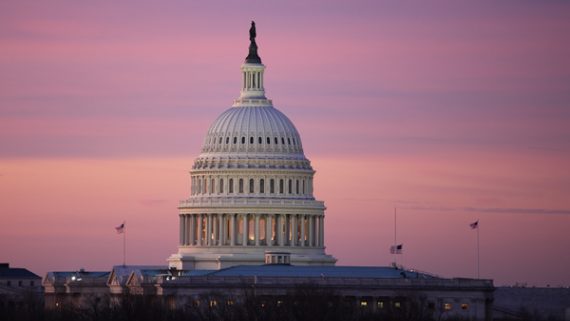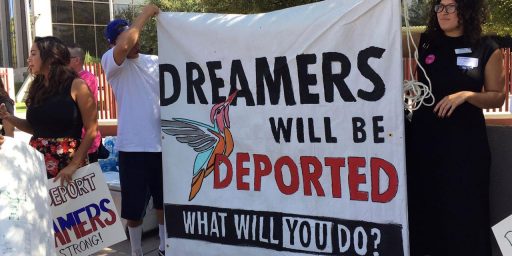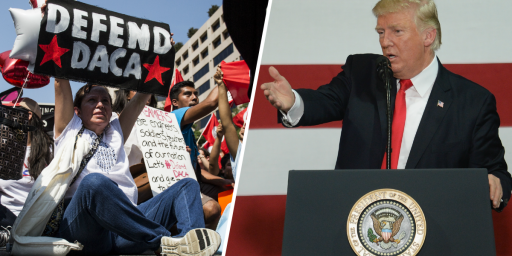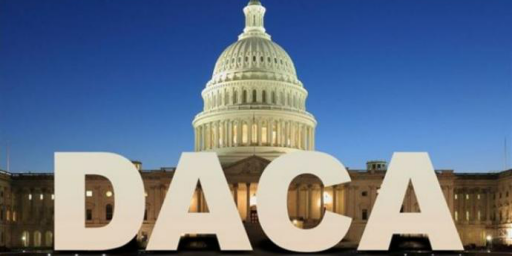Senate Rejects Four Different Proposals To Extend DACA Benefits
The prospect for a fix to help DACA beneficiaries is looking gloomier than ever.
With the Senate headed for a week-long President’s Day recess next week, the fate of the beneficiaries of former President Obama’s Deferred Action For Childhood Arrivals (DACA) program facing the theoretical deadline of a March 5th expiration date, the outlook is not looking good.
As I noted yesterday, a bipartisan group of Senators put forward a proposal that seemed at first glance to be entirely reasonable. Under that plan, DACA beneficiaries, as well as a wider group of people who fell into the general category of the “Dreamers” but didn’t qualify for DACA for one reason or another, would receive legal status that could eventually lead to a path to citizenship that would take twice as long as other people who have Permanent Resident Alien status. Additionally, there would be funding for border security measures, although not at the level that the President requested and none of it would be specifically earmarked for the so-called “border wall” with Mexico. The proposal did not address issues such as the visa lottery or s0-called “chain migration.” In addition to that proposal, there was also a related but similar plan offered by Senators John McCain and Chris Coons that would have extended DACA benefits and spent money on border security, but again would not have directly funded a “border wall.” Finally, there was the plan presented by the White House which would have extended DACA protections in much the same manner as the other two versions, funded the border wall, ended the visa lottery, and mostly ended so-called “chain migration.”
By the end of the day yesterday, the Senate had rejected all of these proposals, plus several others:
WASHINGTON — The Senate summarily blocked three measures on Thursday — including one backed by President Trump — to resolve the fate of the so-called Dreamers, leaving hundreds of thousands of them facing an uncertain future.
As senators struck down measure after measure, a week that began with the promise of a rare open, free-ranging debate on the issue crashed headlong into the same divisions that have prevented Congress from fixing the nation’s immigration system for decades. The lack of consensus left in question whether any solution on the Dreamers can be reached.
In a rebuke to the president, senators voted overwhelmingly, 39 to 60, against the White House-backed bill, which would have committed $25 billion for a wall along the border with Mexico, placed strict limits on legal immigration, ended the diversity visa lottery and offered 1.8 million Dreamers an eventual path to citizenship.
Senators were 21 votes short of the 60 required to open debate, and the rejection of the president’s plan was bipartisan: Democrats refused its get-tough approach to legal immigration, while many conservative Republicans derided it as amnesty.
Before the vote on Mr. Trump’s plan, senators rejected two bipartisan measures, including one written by Senators John McCain, Republican of Arizona, and Chris Coons, Democrat of Delaware, and another drafted by a broad bipartisan group of centrists calling themselves the Common Sense Coalition.
The votes were a stark reminder that Congress remains paralyzed by the immigration issue. Former Presidents Barack Obama and George W. Bush both tried to overhaul the system, but were stymied by lawmakers frozen into inaction, in part because of powerful interests on both sides.
What will happen now is unclear. An estimated 690,000 young undocumented immigrants have been protected from deportation by an Obama-era program, Deferred Action for Childhood Arrivals, or DACA. Another 1.1 million would be eligible.
But Mr. Trump has rescinded the program, which offers temporary, renewable work permits. It expires March 5.
The White House had worked vigorously to oppose the centrist bill, which the Department of Homeland Security labeled “a mass amnesty for over 10 million illegal aliens.” Senators of both parties said afterward that the Trump administration was instrumental in its defeat.
“I don’t think the president helped very much, but the bottom line is the demagogues won again on the left and the right,” said Senator Lindsey Graham, Republican of South Carolina and a key sponsor of the Senate measure.
Some Dreamers, many of whom have known no country other than the United States, are hopeful that the judicial system will protect them. Two federal courts have issued injunctions ordering the Trump administration to keep DACA in place for those already receiving its protections, but the Justice Department has asked the Supreme Court to intervene and overturn lower court rulings.
Thursday’s votes came after Senator Mitch McConnell, Republican of Kentucky and the majority leader, had set aside this week for senators to try to write a bill from scratch. Some senators said it was possible that lawmakers would attach an immigration bill to a catchall spending measure that must pass by March 23, when funding for the federal government expires.
Senator John Cornyn, the No. 2 Republican in the Senate, said he did not envision Mr. McConnell allowing more time for lawmakers to debate the issue.
“I don’t see it,” Mr. Cornyn said. “If we couldn’t get it together this week, I mean, we’ve got other things we have to do, which are pressing.”
More from The Washington Post:
Weeks of intense negotiations for a bipartisan deal on immigration collapsed in Congress on Thursday, leaving hundreds of thousands of young undocumented immigrants facing possible deportation.
The rejection of four proposals in the Senate, coupled with a lack of consensus in the House, underscored the immense political pressures on Republicans and Democrats alike.
Immigration has proved intractable for years, vexing lawmakers and presidents of both parties. Breaking the stalemate in an election year seemed even more unlikely.
In a sharp rebuke, the Republican-led Senate blocked an immigration plan backed by President Trump, with the bill mustering just 39 votes. It highlighted the divisions even within GOP ranks, with some wary that granting legal status to undocumented immigrants would amount to amnesty.
The House offered no answers, with conservatives threatening Speaker Paul D. Ryan (R-Wis.) unless he pushes a bill that provides only temporary work permits for dreamers, while also imposing border-security measures and restrictions on legal immigration that go beyond what Trump has proposed.
“I don’t think the president helped very much, but the bottom line is the demagogues won again on the left and the right,” said Sen. Lindsey O. Graham (R-S.C.).
How the Trump administration and Congress will resolve the fate of dreamers — undocumented immigrants who were brought into the country as children — remained unclear Thursday, but several senators said they hoped a solution could be included in a sweeping spending plan that must be passed by March 23.
Proposals have been floated by senators in both parties to temporarily extend the Deferred Action for Childhood Arrivals (DACA) program — which is set to end on March 5 — and provide some funding to begin border-security construction projects. Courts in California and New York have issued temporary injunctions requiring the administration to extend DACA; those rulings could render Trump’s deadline moot.
In the Senate on Thursday, the atmosphere was corrosive.
Senate Minority Leader Charles E. Schumer (D-N.Y.) blamed Trump, who had tweeted moments before the votes that the bipartisan plan was a “total catastrophe” that faced the threat of a veto.
“If he would stop torpedoing bipartisan efforts, a good bill would pass,” Schumer said.
Sen. Tom Cotton (R-Ark.), a strong proponent of the president’s plan, said there was “broad agreement about how to solve this problem, but we won’t succeed unless the Democrats stop this incessant virtue-signaling and start negotiating in good faith.”
A senior White House official said Senate Majority Leader Mitch McConnell (R-Ky.) wants to move on from immigration, and the White House is inclined to agree. The individual, who spoke on the condition of anonymity to discuss the conversations, said McConnell has told White House officials that there is little appetite in his conference for continuing an immigration fight.
McConnell has told others that any bill he could pass in the Senate would be unlikely to earn Trump’s support.
(…)
Over the course of 90 minutes Thursday, the debate ended with no breakthrough.
Senators rejected a watered-down bipartisan plan by Sens. John McCain (R-Ariz.) and Christopher A. Coons (D-Del.) to grant legal status to dreamers and provide billions of dollars to boost border security — but not immediately as Trump requested. The plan failed 52 to 47, short of the 60 votes needed.
Senators also rejected a bill by Sen. Patrick J. Toomey (R-Pa.) to punish “sanctuary” municipalities that refuse to help enforce immigration laws. That bill failed 54 to 45.
Much of the Senate’s attention was on the third option, a bipartisan plan to legalize the same number of undocumented immigrants and appropriate $25 billion for southern-border-security construction projects over the next decade — not immediately as Trump wants. That bill also would curb family-based immigration programs but not to the extent Trump is seeking, and it said nothing about the diversity visa lottery program.
The bipartisan proposal laid bare how difficult it can be for members of both parties to try striking a deal. United We Dream — a dreamer advocacy group that works closely with Democrats — and the White House had aggressively lobbied against the measure.
(…)
The bipartisan plan failed 54 to 45.
Finally, senators rejected the Trump plan, which would have granted legal status to 1.8 million young immigrants, spent at least $25 billion to bolster security along the U.S.-Mexico border, revamped family-based legal migration programs and ended a diversity lottery system used by immigrants from countries with low rates of immigration to the United States.
The vote was 39 to 60, well short of the 60 yes votes needed to move ahead. Three moderate Democrats voted for the proposal, but 14 GOP senators voted against it, including Sen. Ted Cruz (Tex.), who had blasted the proposal as being “to the left from President Obama’s position.”
All of this brings an end to a week that had begun with at least some hope that the Senate could come up with a plan that could at least gain the sixty votes necessary to invoke cloture and get to a final vote, even though the fate of any bill that could pass the Senate succeeding in the House was looking grim from the start. The bipartisan group I noted above had been working since the government shutdown ended last month but had not come up with a proposal by the time the Senate opened debate on the issue. Meanwhile, the White House took a hardline position by threatening to veto any proposal that didn’t match the outline of what had been proposed by the President in January and members of the Administration and representatives of the Department of Homeland Security, which oversees enforcement of the nation’s immigration law, were bad-mouthing the competing plans even before they were formally introduced. Over in the House, hardliners were basically saying that nothing that the Senate was considering, including the President’s own proposal, would get through that body, principally over the issue of allowing people who benefited from protection under those proposals a path to eventual citizenship. With yesterday’s vote, though, it’s not even clear that anything can get through the Senate.
The New York Times Editorial Board blames the Trump Administration for the collapse of the DACA proposals in the Senate, while The Washingon Post’s Aaron Blake calls the whole thing “a giant game of chicken:”
Congress had a deadline, a mandate from the president, and an overwhelmingly popular program on which to center its latest immigration reform effort. And yet, as it has so many times before, it again came up well short. Four separate votes on four separate immigration packages all failed on Thursday, leaving the immigration debate as stuck as it has ever been and adding to the failures of 2007, 2010 and 2013. And that’s despite the almost universal desire to pass something — anything— to protect “dreamers.”
Now we’re headed for a game of chicken.
March 5 is the deadline for the Deferred Action for Childhood Arrivals (DACA) program’s expiration, after President Trump terminated President Barack Obama’s executive action protecting hundreds of thousands of undocumented immigrants who were brought to the United States as children. The expiration could be delayed for months because of court challenges, but we are basically headed for a situation in which dreamers could lose their protections.
Almost everybody says they don’t want that, including Trump. Yet he has attempted to use DACA as a bargaining chip in negotiations with Democrats to get more border security and even funding for a border wall. It’s a highly unusual setup in which Democrats have basically been making concessions in exchange for something Trump has said he wants Congress to codify. Apparently in a desire to make it happen — and recognizing that Republicans have the power over which bills to vote on — Democrats have played ball.
But patience with what Democrats view as their good-faith effort to negotiate has now apparently run out. It’s now about public pressure and gamesmanship as we draw closer and closer to the possible end of DACA.
(…)
Trump and fellow Republicans may argue that it is congressional Democrats’ fault for failing to make enough concessions in the deals that earned votes Thursday. But strictly speaking, Trump is the one who undid DACA, and Congress could probably pass a stand-alone DACA bill immediately if he urged Congress to do so. He hasn’t done so, of course, and the White House has even suggested that it would veto the bipartisan Schumer-Rounds-Collins bill that came up six votes shy Thursday despite it containing plenty of concessions in exchange for DACA.
The question is whether that changes as we get closer to a deadline. Both sides seem to think that the other will cave eventually. Given the spectacular failures of the four bills on Thursday, it seems that is about all that is left in this debate.4
What all this means going forward is unclear, but it doesn’t look good.
Over in the House, meanwhile, things are looking even grimmer. As I noted, even the White House’s proposal was being resisted by hardliners in the GOP caucus due to the fact that it more than doubled the number of people who would be eligible for DACA-like protections and that those people who eventually be entitled to pursue a path to citizenship. Instead, this group, those hardliners are pushing a plan advanced by Virginia Congressman Bob Goodlatte, the Chairman of the House Judiciary Committee. That plan would provide DACA beneficiaries with a temporary, renewable legal status but would not allow them to ever become citizens, would fund Trump’s border wall, and would end the visa lottery as well as so-called “chain migration. Even that bill, though, doesn’t appear to have the support of 218 members that would be needed to pass.
While Federal Court rulings in California and New York mean that DACA beneficiaries who are currently eligible under the program cannot be put under threat of deportation while the injunctions those courts have issued remain in effect, that doesn’t mean that the fate of those beneficiaries is completely secure. The injunctions do not provide protection, for example, for anyone who falls out of DACA status while they are pending, and they do not require immigration authorities to either accept or grant renewal requests that would have been automatically accepted had DACA been permitted to stay in place. By some estimates, this means that dozens of DACA beneficiaries are falling out of status every day and could be subject to apprehension and the beginning of deportation proceedings. Additionally, the status of those court rulings could end up being temporary depending on whether or not the Supreme Court agrees to accept the California case for appeal or to rule on the government’s request to reverse the stay on enforcement of the President’s September decision to end DACA altogether.
Thanks to all of this, Congress heads into a weeklong recess with no prospect of a DACA fix on the table, and no signs that anything that is being proposed as of yet could pass even one chamber of Congress, never mind both. All of this while the DACA beneficiaries look at the calendar moves from day to day.







The 60-vote Senate strikes again.
@Steven L. Taylor: Indeed. I’d scanned over this post before, was curious about the one comment, now find it typically thought-provoking.
You singled out my personal favorite for the ‘disruption’ of our norms of democratic behavior. I have decided that I might be in the last cohort to believe ‘majority rules’ (within the bounds of minority rights and fair future competition). As I was taught it, that’s sort of foundational to what we may call ‘democracy’.
Grump grump and all you kids get off my lawn! I’m starting to sound like our friend Mr “Q”.
I wonder if the regularization of DACA beneficiaries is popular enough that a clean bill can pass.
Oh, I know it’s not that popular with Republicans, and it must be positively unpopular with the nativist base.
We should apply the Republican standard on DACA for every illegal action a child commits unknowingly thanks to their parents to people no matter how old they are.
Did your parents let you drink some wine before you were 21 (or 18)? You’re deported. Sorry. You should’ve told your parents no.
Rode in a car without a carseat or seatbelt? Sorry. Deported.
Trump’s plan would increase the DACA people by one million, and it would give the 1.8 million citizenship.
What about that do the Democrats not like?